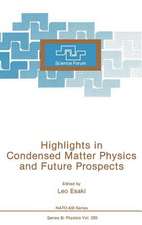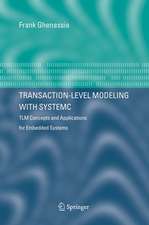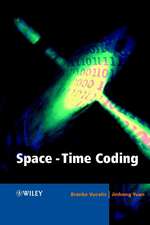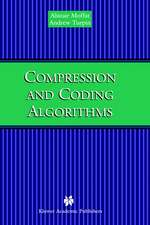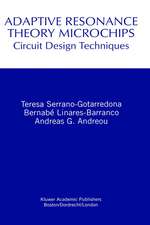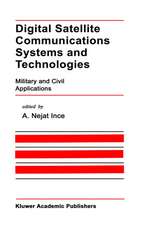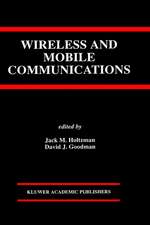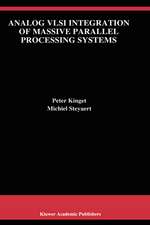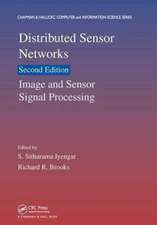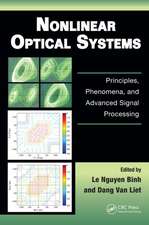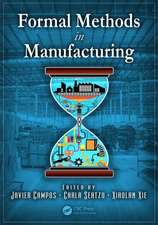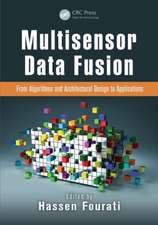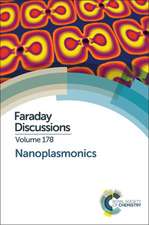Turbo Codes: Principles and Applications: The Springer International Series in Engineering and Computer Science, cartea 559
Autor Branka Vucetic, Jinhong Yuanen Limba Engleză Paperback – 4 oct 2012
| Toate formatele și edițiile | Preț | Express |
|---|---|---|
| Paperback (1) | 946.72 lei 6-8 săpt. | |
| Springer Us – 4 oct 2012 | 946.72 lei 6-8 săpt. | |
| Hardback (1) | 954.45 lei 6-8 săpt. | |
| Springer Us – 30 iun 2000 | 954.45 lei 6-8 săpt. |
Din seria The Springer International Series in Engineering and Computer Science
- 24%
 Preț: 1041.98 lei
Preț: 1041.98 lei - 20%
 Preț: 643.50 lei
Preț: 643.50 lei - 18%
 Preț: 1225.62 lei
Preț: 1225.62 lei - 18%
 Preț: 965.02 lei
Preț: 965.02 lei - 20%
 Preț: 646.12 lei
Preț: 646.12 lei - 18%
 Preț: 948.79 lei
Preț: 948.79 lei - 20%
 Preț: 646.62 lei
Preț: 646.62 lei - 15%
 Preț: 637.46 lei
Preț: 637.46 lei - 20%
 Preț: 643.83 lei
Preț: 643.83 lei - 18%
 Preț: 949.23 lei
Preț: 949.23 lei - 20%
 Preț: 644.48 lei
Preț: 644.48 lei - 20%
 Preț: 994.92 lei
Preț: 994.92 lei - 20%
 Preț: 645.97 lei
Preț: 645.97 lei - 18%
 Preț: 946.87 lei
Preț: 946.87 lei - 20%
 Preț: 995.57 lei
Preț: 995.57 lei - 18%
 Preț: 956.99 lei
Preț: 956.99 lei - 20%
 Preț: 644.98 lei
Preț: 644.98 lei - 15%
 Preț: 649.54 lei
Preț: 649.54 lei - 18%
 Preț: 950.21 lei
Preț: 950.21 lei - 18%
 Preț: 1221.38 lei
Preț: 1221.38 lei - 18%
 Preț: 957.62 lei
Preț: 957.62 lei - 15%
 Preț: 643.99 lei
Preț: 643.99 lei - 18%
 Preț: 948.47 lei
Preț: 948.47 lei - 18%
 Preț: 947.35 lei
Preț: 947.35 lei - 20%
 Preț: 1284.65 lei
Preț: 1284.65 lei - 20%
 Preț: 1628.31 lei
Preț: 1628.31 lei - 20%
 Preț: 1285.78 lei
Preț: 1285.78 lei
Preț: 946.72 lei
Preț vechi: 1154.54 lei
-18% Nou
Puncte Express: 1420
Preț estimativ în valută:
181.18€ • 196.73$ • 152.19£
181.18€ • 196.73$ • 152.19£
Carte tipărită la comandă
Livrare economică 22 aprilie-06 mai
Preluare comenzi: 021 569.72.76
Specificații
ISBN-13: 9781461370130
ISBN-10: 1461370132
Pagini: 344
Ilustrații: XXVI, 312 p.
Dimensiuni: 155 x 235 x 18 mm
Greutate: 0.48 kg
Ediția:Softcover reprint of the original 1st ed. 2000
Editura: Springer Us
Colecția Springer
Seria The Springer International Series in Engineering and Computer Science
Locul publicării:New York, NY, United States
ISBN-10: 1461370132
Pagini: 344
Ilustrații: XXVI, 312 p.
Dimensiuni: 155 x 235 x 18 mm
Greutate: 0.48 kg
Ediția:Softcover reprint of the original 1st ed. 2000
Editura: Springer Us
Colecția Springer
Seria The Springer International Series in Engineering and Computer Science
Locul publicării:New York, NY, United States
Public țintă
ResearchCuprins
1 Introduction.- 1.1 Digital Communication System Structure.- 1.2 Fundamental Limits.- 2 Block Codes.- 2.1 Block Codes.- 2.2 Linear Systematic Block Codes.- 2.3 Parity Check Matrix.- 2.4 The Minimum Distance of a Block Code.- 2.5 Maximum Likelihood Decoding of Block Codes for a BSC Channel.- 2.6 Maximum Likelihood Decoding of Block Codes for a Gaussian Channel.- 2.7 Weight Distribution of Block Codes.- 2.8 Performance Upper Bounds.- 2.9 Coding Gain.- 2.10 Soft Decision Decoding of Block Codes.- 2.11 Trellis Structure of Linear Binary Block Codes.- 3 Convolutional Codes.- 3.1 Introduction.- 3.2 The Structure of (n,1)Convolutional Codes.- 3.3 The Structure of (n,k) Convolutional Codes.- 3.4 Systematic Form.- 3.5 Parity Check Matrix.- 3.6 Catastrophic Codes.- 3.7 Systematic Encoders.- 3.8 State Diagram.- 3.9 Trellis Diagram.- 3.10 Distance Properties of Convolutional Codes.- 3.11 Weight Distribution of Convolutional Codes.- 3.12 Punctured Convolutional Codes.- 4 Turbo Coding Performance Analysis and Code Design.- 4.1 Introduction.- 4.2 Turbo Coding.- 4.3 Performance Upper Bounds of Turbo Codes.- 4.4 Turbo Code Performance Evaluation.- 4.5 Turbo Code Design.- 4.6 Serial Concatenated Convolutional Codes.- 5 Trellis Based Decoding of Linear Codes.- 5.1 Introduction.- 5.2 System Model.- 5.3 Optimization Criteria.- 5.4 The Viterbi Algorithm.- 5.5 The Bidirectional Soft Output Viterbi Algorithm ..- 5.6 Sliding Window SOVA.- 5.7 The MAP Algorithm.- 5.8 The Max-Log-MAP Algorithm.- 5.9 The Log-MAP Algorithm.- 5.10 Comparison of Decoding Algorithms.- 6 Iterative Decoding.- 6.1 Optimum Decoding of Turbo Codes.- 6.2 Iterative Decoding of Turbo Codes Based on the MAP Algorithm.- 6.3 The Effect of the Number of Iterations on Turbo Code Performance.- 6.4 The Effect of Interleaver Size onTurbo Code Performance.- 6.5 The Effect of Puncturing Component Codes on Turbo Code Performance.- 6.6 Comparison Between Analytical Upper Bounds and Simulation Results.- 6.7 Asymptotic Behavior of Turbo Codes.- 6.8 Iterative SOVA Decoding of Turbo Codes.- 6.9 Comparison of MAP and SOVA Iterative Decoding Algorithms.- 6.10 Iterative MAP Decoding of Serial Concatenated Convolutional Codes.- 6.11 Iterative SOVA Decoding of Serial Concatenated Convolutional Codes.- 6.12 Serial Concatenated Convolutional Codes with Iterative Decoding.- 7 Interleavers.- 7.1 Interleaving.- 7.2 Interleaving with Error Control Coding.- 7.3 Interleaving in Turbo Coding.- 7.4 Block Type Interleavers.- 7.5 Convolutional Type Interleavers.- 7.6 Random Type Interleavers.- 7.7 Code Matched Interleavers.- 7.8 Design of Code Matched Interleavers.- 7.9 Performance of Turbo Codes with Code Matched Interleavers.- 7.10 Performance of Turbo Codes with Cyclic Shift Interleavers.- 8 Turbo Coding for Fading Channels.- 8.1 Introduction.- 8.2 Fading Channels.- 8.3 Statistical Models for Fading Channels.- 8.4 Capacity of Fading Channels.- 8.5 Performance Upper Bounds on Fading Channels.- 8.6 Iterative Decoding on Fading Channels.- 8.7 Performance Simulation Results on Fading Channels.- 9 Turbo Trellis Coded Modulation Schemes.- 9.1 Introduction.- 9.2 Binary Turbo Coded Modulation.- 9.3 Turbo Trellis Coded Modulation.- 9.4 I-Q Turbo Coded Modulation for Fading Channels.- 10 Applications of Turbo Codes.- 10.1 Turbo Codes for Deep Space Communications . . ..- 10.2 Turbo Codes for CDMA2000.- 10.3 Turbo Codes for 3GPP.- 10.4 Turbo Codes for Satellite Communications.

